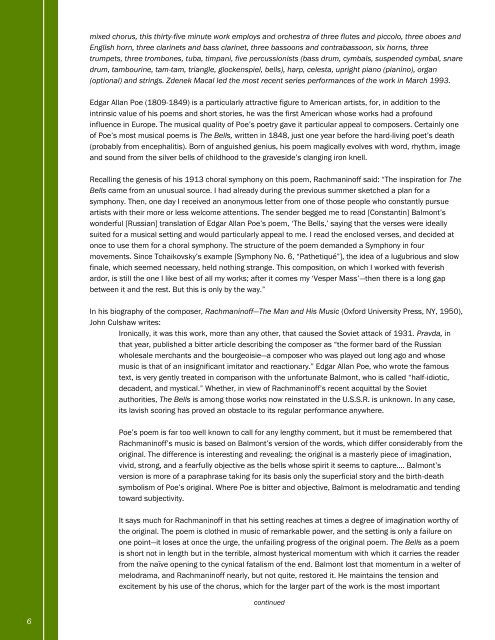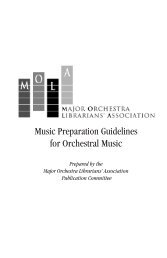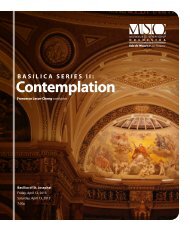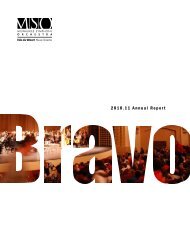All Rachmaninoff - Milwaukee Symphony Orchestra
All Rachmaninoff - Milwaukee Symphony Orchestra
All Rachmaninoff - Milwaukee Symphony Orchestra
You also want an ePaper? Increase the reach of your titles
YUMPU automatically turns print PDFs into web optimized ePapers that Google loves.
6<br />
mixed chorus, this thirty-five minute work employs and orchestra of three flutes and piccolo, three oboes and<br />
English horn, three clarinets and bass clarinet, three bassoons and contrabassoon, six horns, three<br />
trumpets, three trombones, tuba, timpani, five percussionists (bass drum, cymbals, suspended cymbal, snare<br />
drum, tambourine, tam-tam, triangle, glockenspiel, bells), harp, celesta, upright piano (pianino), organ<br />
(optional) and strings. Zdenek Macal led the most recent series performances of the work in March 1993.<br />
Edgar <strong>All</strong>an Poe (1809-1849) is a particularly attractive figure to American artists, for, in addition to the<br />
intrinsic value of his poems and short stories, he was the first American whose works had a profound<br />
influence in Europe. The musical quality of Poe’s poetry gave it particular appeal to composers. Certainly one<br />
of Poe’s most musical poems is The Bells, written in 1848, just one year before the hard-living poet’s death<br />
(probably from encephalitis). Born of anguished genius, his poem magically evolves with word, rhythm, image<br />
and sound from the silver bells of childhood to the graveside’s clanging iron knell.<br />
Recalling the genesis of his 1913 choral symphony on this poem, <strong>Rachmaninoff</strong> said: “The inspiration for The<br />
Bells came from an unusual source. I had already during the previous summer sketched a plan for a<br />
symphony. Then, one day I received an anonymous letter from one of those people who constantly pursue<br />
artists with their more or less welcome attentions. The sender begged me to read [Constantin] Balmont’s<br />
wonderful [Russian] translation of Edgar <strong>All</strong>an Poe’s poem, ‘The Bells,’ saying that the verses were ideally<br />
suited for a musical setting and would particularly appeal to me. I read the enclosed verses, and decided at<br />
once to use them for a choral symphony. The structure of the poem demanded a <strong>Symphony</strong> in four<br />
movements. Since Tchaikovsky’s example [<strong>Symphony</strong> No. 6, “Pathetiqué”], the idea of a lugubrious and slow<br />
finale, which seemed necessary, held nothing strange. This composition, on which I worked with feverish<br />
ardor, is still the one I like best of all my works; after it comes my ‘Vesper Mass’—then there is a long gap<br />
between it and the rest. But this is only by the way.”<br />
In his biography of the composer, <strong>Rachmaninoff</strong>—The Man and His Music (Oxford University Press, NY, 1950),<br />
John Culshaw writes:<br />
Ironically, it was this work, more than any other, that caused the Soviet attack of 1931. Pravda, in<br />
that year, published a bitter article describing the composer as “the former bard of the Russian<br />
wholesale merchants and the bourgeoisie—a composer who was played out long ago and whose<br />
music is that of an insignificant imitator and reactionary.” Edgar <strong>All</strong>an Poe, who wrote the famous<br />
text, is very gently treated in comparison with the unfortunate Balmont, who is called “half-idiotic,<br />
decadent, and mystical.” Whether, in view of <strong>Rachmaninoff</strong>’s recent acquittal by the Soviet<br />
authorities, The Bells is among those works now reinstated in the U.S.S.R. is unknown. In any case,<br />
its lavish scoring has proved an obstacle to its regular performance anywhere.<br />
Poe’s poem is far too well known to call for any lengthy comment, but it must be remembered that<br />
<strong>Rachmaninoff</strong>’s music is based on Balmont’s version of the words, which differ considerably from the<br />
original. The difference is interesting and revealing; the original is a masterly piece of imagination,<br />
vivid, strong, and a fearfully objective as the bells whose spirit it seems to capture.… Balmont’s<br />
version is more of a paraphrase taking for its basis only the superficial story and the birth-death<br />
symbolism of Poe’s original. Where Poe is bitter and objective, Balmont is melodramatic and tending<br />
toward subjectivity.<br />
It says much for <strong>Rachmaninoff</strong> in that his setting reaches at times a degree of imagination worthy of<br />
the original. The poem is clothed in music of remarkable power, and the setting is only a failure on<br />
one point—it loses at once the urge, the unfailing progress of the original poem. The Bells as a poem<br />
is short not in length but in the terrible, almost hysterical momentum with which it carries the reader<br />
from the naïve opening to the cynical fatalism of the end. Balmont lost that momentum in a welter of<br />
melodrama, and <strong>Rachmaninoff</strong> nearly, but not quite, restored it. He maintains the tension and<br />
excitement by his use of the chorus, which for the larger part of the work is the most important<br />
continued








